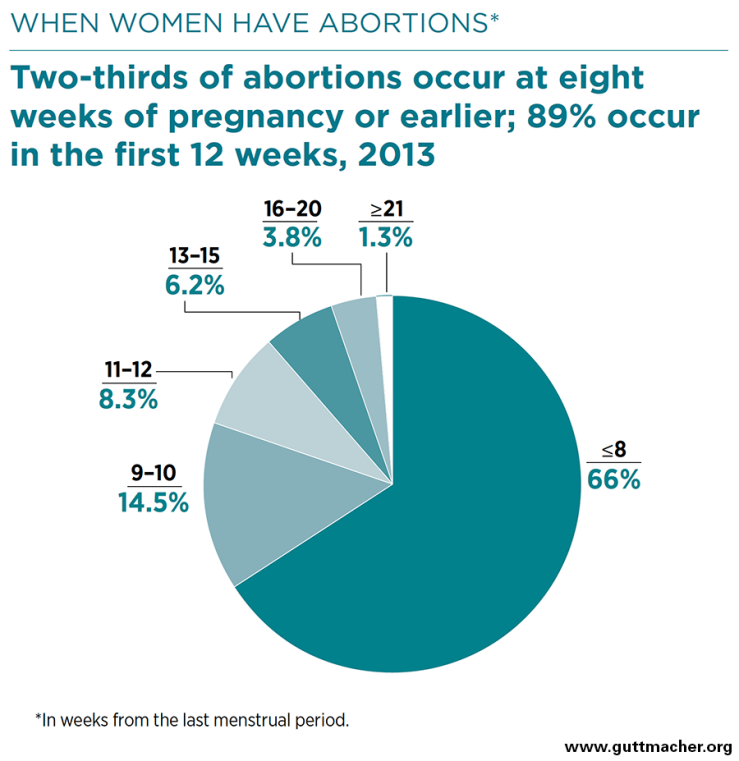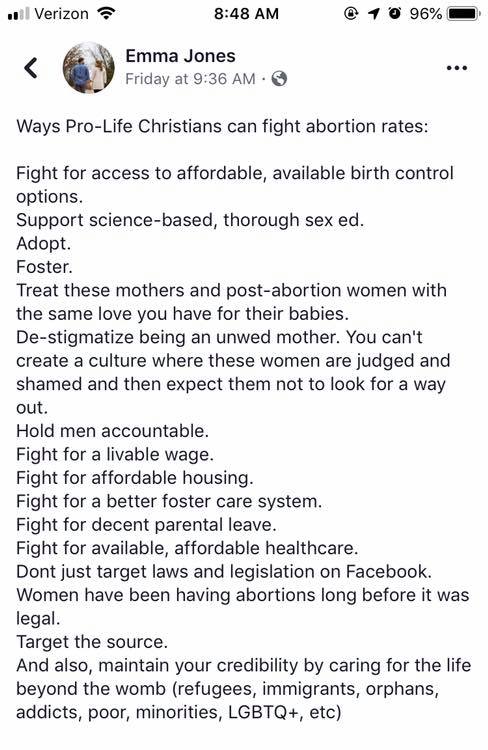When I was younger, I used to love getting into political debates. I would actively seek them out in online forums, and vehemently and openly talk about my beliefs and convictions in real life to anyone who would listen (or argue) with me. One such issue I often tackled was abortion. I’ve always been staunchly pro-choice (though, how I came to that conclusion, I have no idea — most of my family is pro-life), and I would frequently argue with anyone and everyone who dared to want to take such a necessary right away from the people who needed it.
Lately, though, I find that I don’t care to argue with pro-life/anti-choice individuals online any longer. Ever since my abortion almost a year and a half ago, I find it exhausting to have to so repeatedly defend my rights to my own body to people who don’t understand what I went through, and most likely don’t even care to understand.
Recently, though, abortion has been at the forefront of the political scene, since the state of New York passed the Reproductive Health Act (RHA). From the BBC:
The act removes the need for a doctor to perform some abortions and takes abortion out of the criminal code, making it a public health issue.
However, the most controversial aspect of the RHA is the provision allowing abortions after 24 weeks in cases where there is an “absence of foetal viability, or the abortion is necessary to protect the patient’s life or health.”
The RHA seeks to defend women who need abortions because their fetus will not survive birth; women whose fetuses died in the womb, and who don’t want to be forced to carry a dead fetus to term, which poses significant health risks such as sepsis; women whose life and health (both mental and physical) would be jeopardized by giving birth or continuing a non-viable pregnancy — and somehow, people are infuriated that we’re trying to protect women in the most vulnerable positions. Late-term abortions don’t happen for no reason — they most often happen in the most devastating of circumstances.
Yes, arguing about abortion is exhausting, but as someone who has actually lived through the experience, I feel it is my duty to (once again) talk about why abortion is such a fundamental and necessary right, and to defend that right from those who would seek to deprive us of it. First, the facts:
Who Has Abortions?
From the most recent statistics available from the Guttmacher Institute:
- More than half of all U.S. abortion patients in 2014 were in their 20s; twelve percent of abortion patients in 2014 were adolescents.
- Fifty-nine percent of abortions in 2014 were obtained by patients who had had at least one birth.
- Some 75% of abortion patients in 2014 were poor or low-income.
- In 2014, some 46% of all abortion patients had never married and were not cohabiting. However, nearly half were living with a male partner in the month they became pregnant, including 14% who were married and 31% who were cohabiting.
- The reasons patients gave for having an abortion underscored their understanding of the responsibilities of parenthood and family life. The three most common reasons—each cited by three-fourths of patients—were concern for or responsibility to other individuals; the inability to afford raising a child; and the belief that having a baby would interfere with work, school or the ability to care for dependents. Half said they did not want to be a single parent or were having problems with their husband or partner.

Safety of Abortion
- A first-trimester abortion is one of the safest medical procedures and carries minimal risk: Major complications (those requiring hospital care, surgery or transfusion) occur at a rate of less than 0.5%.
- Abortions performed in the first trimester pose virtually no long-term risk of problems such as infertility, ectopic pregnancy, spontaneous abortion (miscarriage) or birth defect.
- Leading experts have concluded that among women who have an unplanned pregnancy, the risk of mental health problems is no greater if they have a single first-trimester abortion than if they carry the pregnancy to term.
Late-Term Abortion
From the Guttmacher Institute’s Evidence You Can Use:
- Although most abortions take place early in pregnancy, 9% of women who obtain an abortion do so after the first trimester (at 14 weeks or later), and slightly more than 1% of abortions are performed at 21 weeks or later.
- Women seeking later abortions typically experience more logistical delays—including difficulties finding a provider, raising funds for the procedure and travel, finding a facility and securing insurance coverage—than women who receive a first-trimester abortion.
- Fifty-eight percent of all abortion patients wish that they could have obtained their abortion earlier.
- In 2012, only 34% of all abortion-providing facilities offered abortions at 20 weeks’ gestation and 16% at 24 weeks.
- Hospitals are more likely than other types of facilities to offer abortions at 20 weeks’ gestation and beyond. Among facilities that perform abortions, two-thirds of hospitals (among those that perform abortions) did so at 20 weeks, compared with 36% of abortion clinics.
- Women sometimes choose to terminate a pregnancy because of fetal medical conditions or because pregnancy poses a threat to their health.
- In 2008-2010, women denied an abortion on the grounds of gestational limit limit felt more regret and anger and less relief and happiness, compared with women who received a near-limit abortion.
- Exposure to disruptive events—such as unemployment or separation from a partner— was associated with increased likelihood of obtaining a second-trimester abortion.
Alright. So we know that women seeking abortions are more likely to be young, poor, and are seeking one because they are worried for their ability to care for a child. This…all sounds pretty familiar to me. When I got my abortion, I was 22, working a minimum wage job, and knew I would be unable to care for a child, both financially and emotionally.
I have a lot of feelings about the manner in which I got pregnant. I got pregnant because my partner refused to buy condoms when I repeatedly asked. Yes, I know that some of you will say I should have just said no to him that night. But here’s the thing. Well, here’s multiple things:
- When I was 16, I came out as asexual to my parents. Instead of being thrilled that his teenage daughter didn’t want to have sex, my father seemed upset that I was abnormal somehow. He told me I would change my mind.
- When I was 18, I was sexually assaulted, then emotionally abused and strung along by the same man for 6 months following that.
- When I was 20, I had sex for the first time in circumstances that are hard to call anything other than rape.
- Throughout most of my late teens and early twenties (including last year, sadly), I kept putting myself into situations of feeling obligated to have sex with men that I liked or cared for in the hopes that it would mean as much to them as it would to me, or that it would get them to love me. It obviously didn’t work, and it wasn’t until I tried stepping back from that that my current relationship was able to start.
- My longest relationship of nearly two years was largely based on sexual attraction, and when we stopped having sex as often, the relationship became rocky.
I’ve been repeatedly told through the actions of many of the men I’ve been with, by the society I was raised in, and by the toxic beliefs I’ve internalized (but have been trying to unlearn) that my worth comes from my ability to sexually please someone. Putting that into perspective, it makes it kind of hard to say no in that situation to anyone, especially someone you love and believe loves you. I’m sure I’m not alone in that experience, because our society, our peers, and the media we consume constantly bombards women with that idea of our worth. I wanted to say no, and I should have said no, but my past traumas wouldn’t let me, either in that moment or in many others.
When I got my abortion, I was the only woman in a waiting room of six who had not already had a child. By all accounts, I probably looked like the supposed worst case for it. I was an unmarried, childless young woman who got an abortion because she simply did not want (and had never wanted) to be a mother. I know that when a lot of arguments in favor of legalizing abortion come up, we have a tendency to focus on the most heartbreaking cases, but I’m here to tell you that it doesn’t matter what the circumstances are. If someone with a uterus does not want to be a parent, does not want to carry a child to term and do often unchangeable damage to their body in the process, does not want to pass on their genes; if a person with a uterus does not want to bring a child in to this world for any reason, that reason is valid. We can’t force people to become parents because they made a mistake. Children are not consequences, and we need to stop treating them as such. I firmly believe that children should only be born to those who seriously, genuinely, and very intentionally want them. Any birth other than that is highly irresponsible, yet we act as if it’s a huge gift, as if these children will never feel unwanted by their own parents, whether they’re kept or given up for adoption.
Nearly one in four women in the United States (23.7%) will have an abortion by age 45. When you loudly judge or condemn the people who get abortions, just know that your family and your friends are listening to you, and they know what you think of them. What I aborted was not a child. It had the potential to become one, yes, but so does every egg and every sperm, and we don’t punish people with uteruses for having periods or people with penises for frivolous masturbation. We have to stop punishing and condemning the people who need abortions, for whatever reason.
If you want abortions to decrease, maybe focus on the things you can do. This post has an excellent layout of the options available to you:

Most importantly, understand that even if you do all these things, abortions will still happen. They are still a necessary right that must be an available option. People with uteruses have always had abortions, and always will, and their legal access to it determines whether or not they will be able to safely do so. If you truly want to call yourself pro-life, maybe value the lives of people who already exist, people who don’t want to die from complications of dangerous back-alley procedures.
Abortion is a necessary right. It always has been, and always will be.
